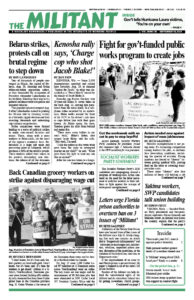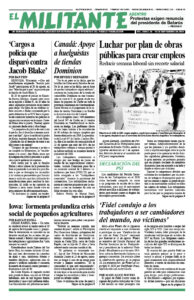September 18, 1995
HUAIROU, China — [At] the forum on women here, more than 20,000 have proceeded in holding discussions, workshops, marches, processions, debates, and distributing literature on the fight for women’s rights.
Daily protests have occurred on the conference grounds, from marches against nuclear weapons testing led by Japanese and Pacific Island activists to a demonstration protesting discrimination against lesbians.
A number of protests were organized on the issue of the comfort women — those pressed into sexual slavery by the Japanese military during World War II. Among them was a meeting organized by women from North and South Korea.
Cuban women also sponsored workshops. On Sept. 5 a march of several hundred against U.S. policy on Cuba wound its way through the grounds of the nongovernmental forum.
September 18, 1970
LOS ANGELES — The police attack on the Chicano Moratorium in Los Angeles has brought about a sharp confrontation between an enraged community and the ruling class of the Los Angeles area.
Learning lessons from the Black struggle and the colonial revolutions, the Chicano community has moved to the forefront of political life, particularly in the Southwest, but also, to a degree, in the United States as a whole. This last year has seen the radicalization and initial mobilization and independent political organization of the Chicano masses.
This experience of the last two years contains several lessons for the Chicano struggle and for other movements in the United States: the importance of the war issue; the importance of mass action; the importance of the struggle for non-exclusion and the united front; the need for independent political organization.
September 15, 1945
CLEVELAND, Sept. 6 — In the greatest demonstration of labor militancy and solidarity this city has witnessed in years, more than 2,000 organized workers today joined in a mass picket line that gave a fitting answer to the bloody police brutality yesterday against strike pickets of the AFL Machinists in the two-week-old Parker Appliance walkout.
The beating of the pickets occurred when they were attempting to persuade a carload of office personnel to turn back from the plant gate. Without warning, a troop of 26 mounted police charged with their huge horses directly into the picket line, mercilessly trampling and clubbing the unarmed workers.
Before this tremendous outburst of militancy and solidarity, the police and company had to beat a retreat. Parker Appliance “advised” its office personnel to remain home “until further notice.”

